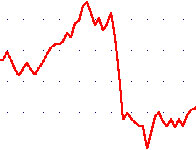 Where Did The Seven Trillion Dollars Go? A New, Simple, Transparent System Needed for Purchasing and Selling Stock By Christos and Mary Papoutsy Click here for Greek Translation |
|||
This gargantuan seven-trillion-dollar loss in stock values has disappeared from pension plans, mutual funds, the holdings of institutions, and 401K plans. It will significantly affect capital gains revenues that the U.S. and other governments receive. The questions being asked by astute observers are "Where did the seven trillion dollars go? And why?" The majority of individuals do not really understand what they are purchasing when they buy stock from their broker. They receive a flood of information on various stocks from their financial planners, stock brokers, investment bankers, among others, giving them recommendations to buy particular stocks. The explanations usually given are that there is an expectation for continued stock growth, increased earnings, and, in general, projections of great things to come for the shareholder of this particular stock. Very little, if any, discussion takes place about how the market value of the stock was created. Instead, potential shareholders are told about projections that may or may not
Insiders, experts, option-holders, financial specialists, traders, and others who fully understand how this system works are rewarded handsomely by shorting stocks and by using sophisticated techniques such as puts, calls, futures, derivations, margins, etc. The result, of course, is great profits for a very small segment of the shareholders and tremendous losses for a large number of the investing public. This majority of investors represents the mid- to upper-level socioeconomic stratum; they are hard working people who have placed much of their hard-earned savings, intended eventually for their children's education and their own retirement needs, into stocks, expecting that this money would ensure their future, only to discover that the bulk of the money has vanished in the volatility of the stock market. What can be done to avoid these financial disasters in the future? What can be done to significantly reduce the tremendous volatility in the stock market that occurs periodically, creating unbearable losses for the stakeholders and general public? The answer is to radically restructure the way that corporations sell stocks directly to everyone. Corporations should sell their stock to whomever wants to purchase it, but at book value, not at the "mumbo-jumbo" market value price. Current public demands for adding more regulations and reformed accounting standards should supplement this proposed new system. In simplified terms, the book value is determined by subtracting all liabilities from all assets, resulting in what the net worth of the company is, then divided by the number of stock shares authorized and issued. The corporations could add a reasonable premium to the book value of their stock, based on the dividend
Most of the time this process of selling stock for approved expenditures increases the value of the company stock. Book value can be increased as more stock is sold to the public and/or from the net earnings generated. Corporations can also offer services to stockholders who want to sell their stocks through a much simpler and transparent system. As of the date of this writing, July 19, 2002, the NASDAQ stock exchange has dropped approximately 75% from its record high in the past year or so, while the Dow Jones Average, about 30%. If all the stocks that make up the Dow Jones Average were to be revalued at book value, then the Dow Jones would fall from 8000 to about 2,000, an additional drop of about 75%. The disparity between the market value and the book value is significant, as these statistics indicate. And these differences raise more questions. Why does any stock have a higher market value per share than the corporation's book value per share? Other than its dividend history and future expectations of dividends, there is no rational, objective reason. Obviously, the world financial institutions would not favor the idea of corporations selling their stock directly at a book value price per share plus a premium for dividends. Generally speaking, the entire stock market as we now know it, would be markedly reduced and modified, similarly affecting banks and the actions of investment bankers and portfolio managers. Auditing requirements and regulation and compliance monitoring would also have to adjust. Nevertheless, a case can and should be make for corporations to offer and sell their stock to whomever wishes to purchase it at book value, based upon our need to eliminate extreme volatility of the market and the domino-effect of losses that spread throughout the world financial markets. Let's leave gambling to the casinos and restore common sense, transparency, and simplicity to the world financial systems. Christos and Mary Papoutsy established the Papoutsy Endowed Chair in Business Ethics at Southern New Hampshire University in 2001. Mr. Papoutsy is a noted - philanthropist and experienced businessman, having successfully run an electronics company with sales worldwide in the hundreds of millions. Mrs. Papoutsy is a Classicist and former educator at the secondary and collegiate levels. Together they are the publishers of the Hellenic Communication Service website and regularly contribute articles on business ethics and other topics of interest. |
|||
|
|

